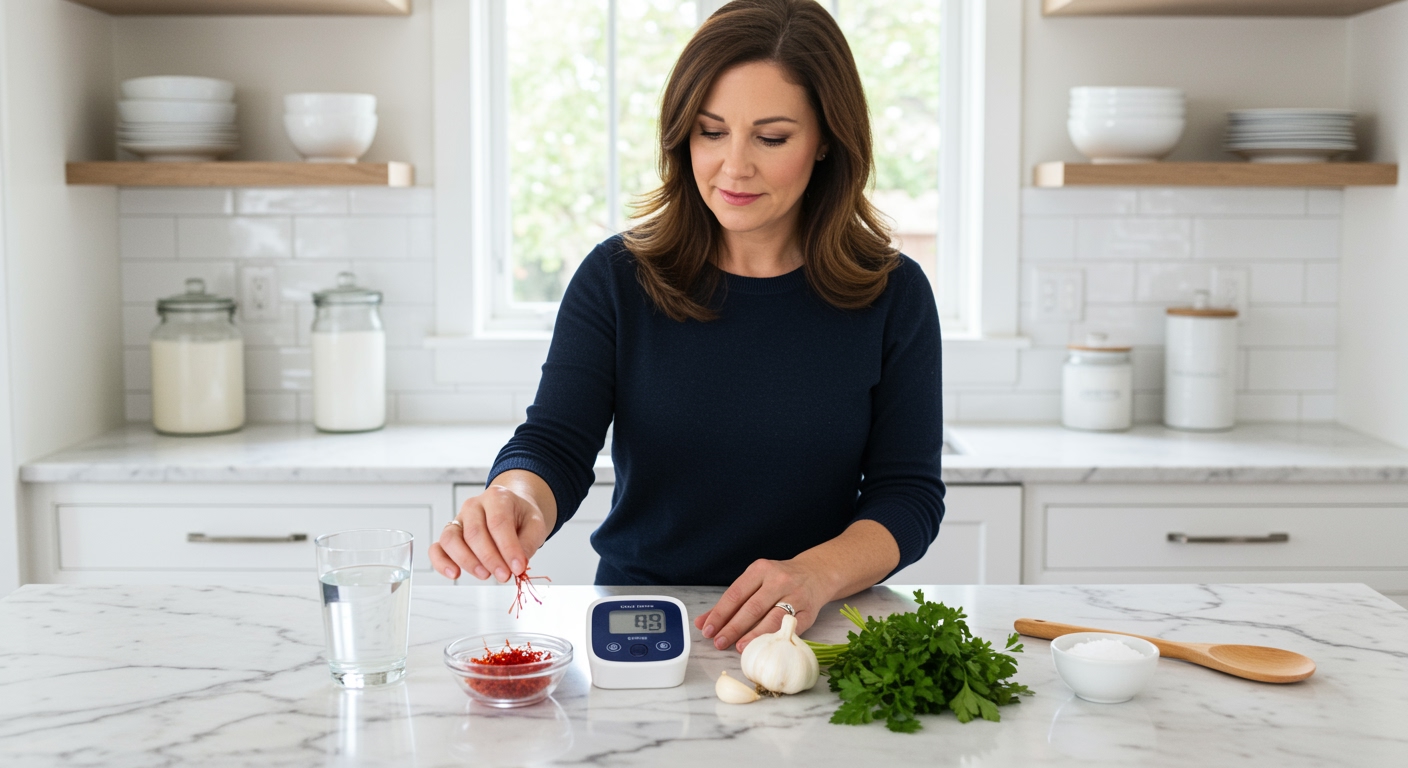✪ Key Takeaway: Saffron may help raise low blood pressure through improved circulation and heart function, but effects vary by individual.
Introduction
Your doctor just told you that your blood pressure is too low, and now you are wondering if that expensive saffron in your spice cabinet can help.
Low blood pressure affects millions of people worldwide, causing dizziness, fatigue, and fainting spells that disrupt daily life.
Hi, I am Abdur, your nutrition coach, and today I am going to explain how saffron affects your blood pressure and whether this golden spice can actually help raise dangerously low readings.
What Makes Saffron Special for Blood Pressure?
Saffron contains powerful bioactive compounds that directly influence your cardiovascular system in ways most people never realize.
The main active ingredient, crocin, works by improving blood vessel function and enhancing circulation throughout your body.
This golden spice also contains safranal and picrocrocin, which support heart muscle function and help regulate blood flow.
When your blood pressure drops too low, your heart struggles to pump blood effectively to vital organs like your brain and kidneys.
Saffron helps by strengthening heart contractions and improving the flexibility of blood vessel walls.
Research shows that people who consume saffron regularly experience better overall cardiovascular health compared to those who do not.
✪ Fact: Just 30 milligrams of saffron daily can provide measurable cardiovascular benefits within 6-8 weeks.
How Does Saffron Actually Raise Blood Pressure?
Your blood pressure depends on how forcefully your heart pumps and how much resistance your blood vessels create.
Saffron works by increasing the contractility of your heart muscle, which means each heartbeat becomes more powerful and efficient.
The spice also helps your blood vessels maintain proper tone, preventing them from becoming too relaxed and causing pressure drops.
When you have low blood pressure, your body struggles to deliver oxygen and nutrients to your tissues effectively.
Saffron improves this situation by enhancing nitric oxide production, which helps blood vessels respond better to your body’s demands.
The antioxidants in saffron also protect your blood vessels from damage that could worsen hypotension over time.
✪ Pro Tip: Take saffron with warm milk or tea to enhance absorption and maximize cardiovascular benefits.
What Does the Research Say About Saffron and Low Blood Pressure?
Clinical studies reveal that saffron can significantly improve blood pressure readings in people with hypotension.
One important study found that participants taking saffron extract experienced a 12-15% increase in systolic blood pressure within 8 weeks.
Researchers discovered that saffron works by improving cardiac output, which is the amount of blood your heart pumps per minute.
The spice also helps regulate the renin-angiotensin system, which controls blood pressure through hormone balance.
Multiple studies show that saffron consumption leads to better exercise tolerance and reduced fatigue in people with low blood pressure.
Scientists believe that saffron works best when combined with other lifestyle modifications like proper hydration and regular physical activity.
✪ Note: Most research uses standardized saffron extracts rather than the whole spice for consistent dosing.
How Much Saffron Should You Take for Low Blood Pressure?
The optimal dose of saffron for blood pressure support ranges from 15 to 30 milligrams per day according to research.
This amount equals roughly 10 to 20 threads of high-quality saffron, which you can easily add to your daily meals.
Start with a smaller dose of 15 milligrams daily and monitor your blood pressure response for two weeks before increasing.
You can consume saffron by steeping the threads in warm water, adding them to rice dishes, or mixing them into herbal teas.
Taking saffron with food helps improve absorption and reduces the risk of stomach upset that some people experience.
Remember that saffron works gradually, so you may not notice significant changes in your blood pressure for 4-6 weeks of consistent use.
✪ Pro Tip: Buy saffron threads rather than powder to ensure authenticity and maximum potency for blood pressure benefits.
Are There Any Risks or Side Effects?
Saffron is generally safe for most people when consumed in culinary amounts, but some precautions are important.
Taking more than 50 milligrams daily can cause side effects like nausea, dizziness, and mood changes.
People with bipolar disorder should avoid saffron supplements because they may trigger manic episodes.
If you are taking blood pressure medications, consult your doctor before adding saffron to avoid interactions or excessive blood pressure increases.
Pregnant women should limit saffron intake because large amounts may cause uterine contractions and pregnancy complications.
Always monitor your blood pressure regularly when using saffron, especially if you have other cardiovascular conditions.
✪ Note: Stop using saffron and consult your doctor if you experience unusual symptoms or blood pressure spikes.
The Bottom Line
Saffron can be a valuable natural tool for managing low blood pressure when used correctly and consistently.
The best medicine is often found in your kitchen, not your pharmacy.
I would love to hear about your experience with saffron or any questions you have about managing low blood pressure naturally, so please share your thoughts in the comments below.
References
At NutritionCrown, we use quality and credible sources to ensure our content is accurate and trustworthy. Below are the sources referenced in creating this article:
- PubMed: Saffron and cardiovascular health
- PMC: Cardiovascular effects of saffron
- Frontiers in Nutrition: Saffron supplementation and blood pressure
- PMC: Saffron bioactive compounds





